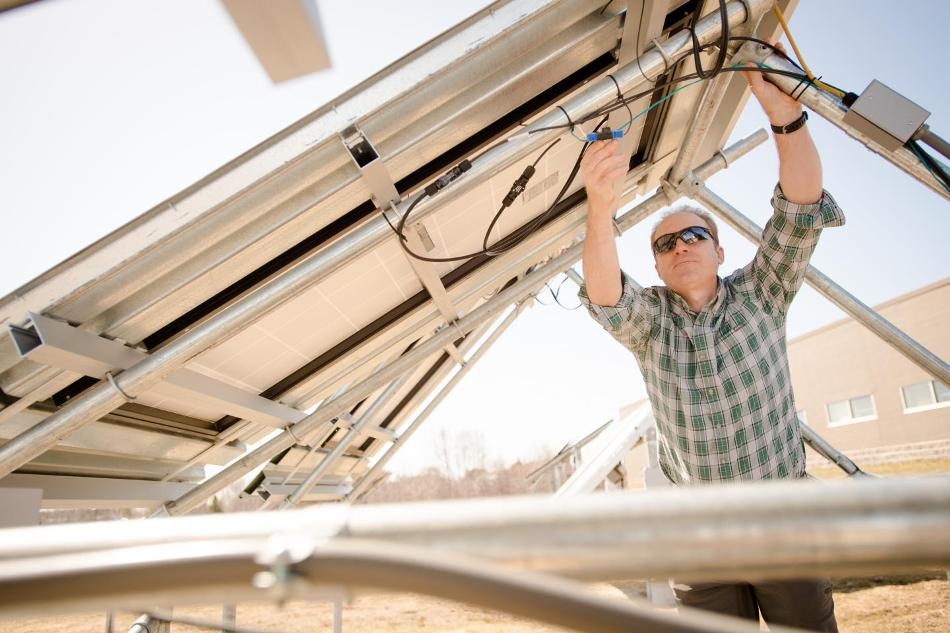Jun 2 2017
A Team of Researchers from Michigan Technological University have calculated the cost of combusting coal with regards to human lives together with the probable advantages of switching to solar. Their work has been published in Renewable & Sustainable Energy Reviews.
 By transitioning to solar photovoltaics (PV) in the US, up to 51,999 American lives would be saved at $1.1 million invested per life. (CREDIT - Sarah Bird/Michigan Tech)
By transitioning to solar photovoltaics (PV) in the US, up to 51,999 American lives would be saved at $1.1 million invested per life. (CREDIT - Sarah Bird/Michigan Tech)
Health Impacts
Annually, several thousands of Americans die prematurely due to air pollution-related diseases linked to burning coal. By moving to solar photovoltaics (PV) in the US, nearly 51,999 American lives would be protected at $1.1 million invested per life.
Unlike other public health investments, you get more than lives saved. In addition to saving lives, solar is producing electricity, which has economic value.
Professor Joshua Pearce, Professor of Materials Science and Electrical Engineering, Michigan Technological University
Using a sensitivity analysis on the value of electricity, which inspects the different costs of electricity that differs by region across the country, saving a life by using solar power also exhibited a potential to make money—at times as much as several million dollars per life, says Pearce.
"Everybody wants to avoid wasting money. Just based off the pure value of electricity of the sensitivities we looked at, it's profitable to save American lives by eliminating coal with solar," he explains.
Pearce teamed with Energy Policy Poctoral Student Emily Prehoda on the research, and their chief focus was to better inform health policy. They collected data from peer-reviewed journals and the Environmental Protection Agency to determine US deaths per kilowatt hour annually for both coal and solar. Then they used present costs of solar installations from the Department of Energy and calculated the probable return on investment.
Pearce and Prehoda also investigated the geographic impact of coal-related deaths. "Here, we have solid numbers on how many people die from air pollution and what fraction of that is due to coal-powered plants in each state."
Power of Solar
To completely replace all coal production in the US with solar PV, it would require 755 GW —a substantial increase compared to the 22.7 GW of solar installed in the US now. The total cost of installing that much solar power will cost $1.5 trillion, but that investment is factored into Pearce and Prehoda's calculations, and is a cost-effective investment.
Solar has come down radically in cost, it's technically viable, and coupled with natural gas plants, other renewables and storage, we have ways to produce all the electricity we need without coal, period.
Professor Joshua Pearce, Professor of Materials Science and Electrical Engineering, Michigan Technological University
He says resisting the growth of solar energy is similar if computer manufacturers continued using vacuum tube switches instead of advancing to semiconductor transistors.
"My overall take away from this study," Pearce says, "is that if we're rational and we care about American lives—or even just money—then it's time to end coal in the US."
Next Steps
The World Health Organization reports that millions die yearly from unhealthy environment, air pollution is particularly one of the largest contributors to non-communicable diseases like chronic respiratory illnesses, cancers, stroke and heart disease. Additional work going forward will help to expand this research worldwide.
"There's roughly seven million people who die globally from air pollution every year, so getting rid of coal could take a big chunk out of that number as well," Pearce says, adding that an additional goal of future research is to investigate the life cycles of coal production as this research only examined air pollution related deaths. By doing so, the numerous positive impacts of solar power and its potential to do more than just keep the lights on will be illuminated.